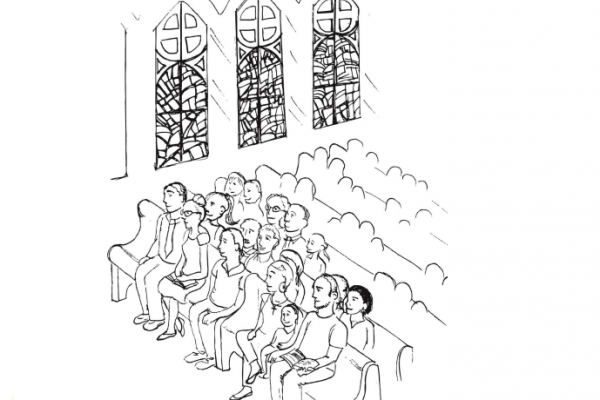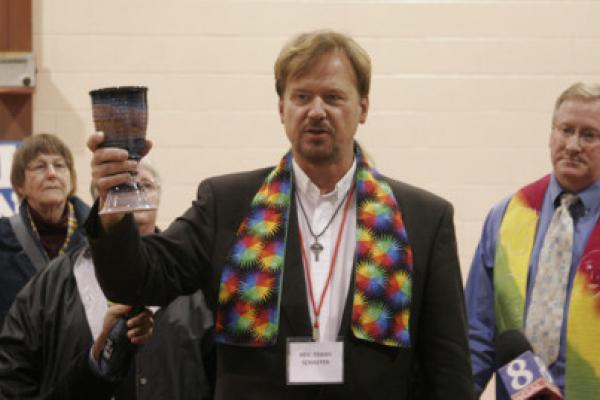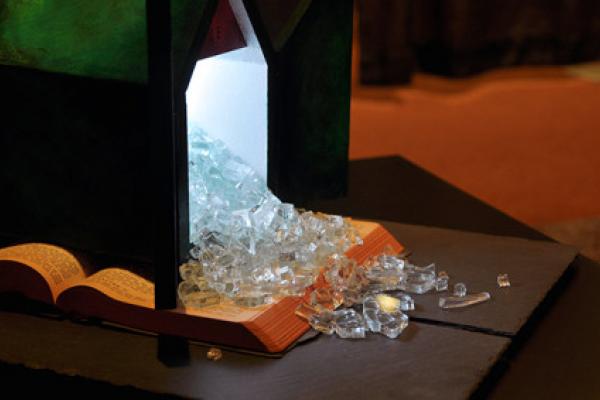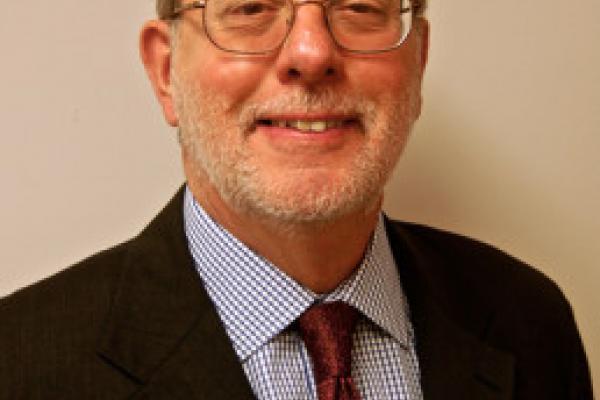A few weeks ago, my father was hospitalized for heart attack symptoms that might have been stroke symptoms that then turned out to be symptoms of something utterly inexplicable. My father, who suffered a massive heart attack in January 2009, and, against all odds and by the grace of God (he flat-lined twice), went on to survive subsequent surgeries and procedures and scares — always against all odds and by God’s grace. Though my father continues to survive and in many ways thrive, every hospitalization is a reminder that life is precious and short and tomorrow is not guaranteed to us.
This development has left me crying out to God, “Why? I know you don’t have to answer that, but … why?” This question reveals my heart: despite having known real and intense suffering in my life, I still live under the illusion that it is not normal. It’s been commonly reported, discussed, and parodied that those of us in the west, particularly in America, have no concept of how to deal with suffering. For many of us, even minor inconveniences — those “first world problems” like slow Internet access or traffic — feel like suffering in a relatively peaceful and easy world.
But as a Christian, I’m confronted by Scripture that reminds me that suffering will be part of our lives. And I’m confronted by the tendency — which I am sure that I share with many of my sisters and brothers — to shun it, preferring Gospels without suffering instead.
I don’t know where God gets the patience. We are absolutely the most difficult people to communicate with! As the Letter to the Hebrews begins, “Long ago God spoke to our ancestors in many and various ways by the prophets.” Many and various ways – thank you, God, for trying everything you could think of to get through to us. And then, as Hebrews continues, “in these last days he has spoken to us by a Son.” And not just any, run-of-the-mill offspring. No! This Son was “appointed heir of all things,” by God, “through whom he also created the worlds.” Sending such a magnificent messenger means nothing less than a passionate desire to be heard: I AM SENDING YOU MY SON, THE ONE THROUGH WHOM I DO MY GREATEST WORK TO SHOW YOU WHO I AM! IS ANYONE LISTENING??
That was two thousand years ago and still God has not abandoned hope. At least I think God hasn’t! Which is so like God. But what is so not like us is that finally, tentatively, it appears that we are beginning to get the message. At least a part of the message that has not gotten through to us before. A Spirit of renewal has been moving through Christianity. New meanings are being discovered in Scripture, meanings that are so strange and unnatural to us that they could only have come from God. Or should I say, that they could only have been coming from God for a long, long time until we finally developed ears to hear.
I thought at first that it was a fictional scene, conflating in one example some of the problems those of us in Christianity face when confronted with issues of domestic violence. The scene was set up as a call to rethink how we articulate our theology in areas like sacrifice and forgiveness and commitment and gender roles.
Here’s what I wrote in The Capital Times in Madison, Wis., that was posted on Sunday:
“A woman has been suffering physical abuse at the hands of her husband. She finally summons up the courage to talk to her pastor about it.
“His advice: First, you need to recognize that your suffering is like Jesus’ suffering. Next, you need to forgive like Jesus forgave. Then remember that you made a commitment to marry this man for life. He is the head of your family, so you need to make sure you are doing what he wants so as not to trigger his anger.
“And then an offer: Let me meet with the two of you and help you patch up your marriage.”
I described it as a fictional scenario. And then I heard this from a friend: “that was the response from my minster regarding my first husband 30 years ago ...”
I’d like to think that many pastors these days are a least a bit wiser both theologically and practically in how they deal with someone facing domestic violence. That’s reflected in a groundbreaking survey released last week by Sojourners at The Summit: World Change Through Faith & Justice.
"Here's how you bring light into the world," says a scruffy-bearded man in shirtsleeves and a knit cap on a Brooklyn rooftop. "First, you get up in the morning and you scream!" His mischievous grin melts into something more ethereally content as he screams. At length.
He's had plenty of practice screaming — he does it for a living.
The man is Yishai Romanoff, lead singer of the hassidic punk band Moshiach Oi and one of the half-dozen artists, activists, and culture-makers profiled in the documentary Punk Jews.
The phrase can seem like an oxymoron: The essence of punk is to challenge inherited convention, yet adherence to rich traditions of convention is the common through-line of all of Judaism's myriad flavors.
One time I took a group of people in the drug rehab program to the local zoo. Most of our group had been to prison – some for years. Most were felons. Most of the women had been prostitutes as well as addicts. Most of them had been homeless, had lengthy criminal records and had, as a group, used virtually every drug — heroin, meth, crack cocaine — and had used every deception, scam, or theft to acquire their drugs. In short, they had been desperate in ways and to a degree most of us could never imagine. If you think a hungry man will commit extreme acts for food to keep from starving, an addict will commit acts a hundred times more extreme. There are few acts an addict will not do.
And yet, few of these former addicts had ever been to a zoo.
One of these people, a woman in her mid-40s, couldn’t contain her excitement as we walked into sight of the resident animals. She shrieked and ran from exhibit to exhibit — until she saw the elephants. We happened to catch the trainer as he was giving a little question-and-answer time. This woman had endless, little kid-type questions about how elephants ate, slept, how they lived, and where they came from.
My sister has one of those plastic playhouses in her backyard for her two boys. When she hosted a garage sale a few years ago, children accompanying their shopping parents would see the playhouse and join in.
I remember looking over at one point and seeing five children playing together. Different ages, different sexes, different races. All strangers. All playing together.
When they looked at each other, they saw a playmate.
In his autobiography, Nelson Mandela noted that children have an innate openness that tends to get closed off as they spend more time in the world.
“No one is born hating another person because of the colour of his skin, or his background, or his religion,” Mandela wrote in his autobiography. “People must learn to hate, and if they can learn to hate, they can be taught to love, for love comes more naturally to the human heart than its opposite.”
One of the most gaping absences in church community often is a point of entry or transition for young adults. We do great with kids, and of course most congregations pant after the coveted “parents with kids” demographic. But what about after high school? How do we serve young adults as they transition to independence for the first time? How do we help them navigate the complexities of adult life, while helping forge in them a sense of character and mission informed by the Christian faith?
One organization taking on these difficult challenges in real, transformative ways is Mission Year. I sat down with Shawn Casselberry, Executive Director of Mission Year, to find out more about how they empower young adults to live out their values in the context of church, community, and even daily life.
In a surprising reversal, a Pennsylvania pastor who was defrocked last year for violating United Methodist law after he officiated at his son’s same-sex wedding has been reinstated.
The committee, which held a hearing June 20 near Baltimore, found that “errors of Church law” had been used in imposing the penalty against Schaefer.
“I was wrongfully punished for standing with those who are discriminated against,” Schaefer said in a statement. “Today’s decision is a sign that the church is starting to listen.”
The decision comes as the world’s 12 million United Methodists appear headed toward a split over the denomination’s rules on ministering to gays and lesbians.
Words and music are the stock-in-trade at most Christian festivals, but the Wild Goose Festival is adding another component: the visual arts.
Run River North and Jars of Clay will headline the musical offerings.
But as with last year, the festival is making an intentional shift to include more visual art; more than 13 artists and arts groups will present their work.
This year’s theme of “Living Liberation” will attempt to challenge conventional Christian art with liturgical painting, a collaborative mural project, experiential storytelling, and an exhibit called Faithmarks that explores spirituality and tattoos.
You are a pastor. You work six days a week, sometimes seven. You are on call 24/7. Every detail of your life is out there for public consumption. People project their unresolved issues onto you, especially parental issues from their childhoods.
By church rules, you are entitled to a sabbatical, perhaps three months every seven years. But when you propose it, you hear what one pastor heard the other day: “Sabbaticals are for academics who are making a significant contribution to their field, not for clergy who want an extended vacation and can’t take working for a living.”
What do you say?
In that one dismissive sentence, someone you trust tells you your work is insignificant, you want a benefit that you don’t deserve, and you’re lazy. What do you do?








